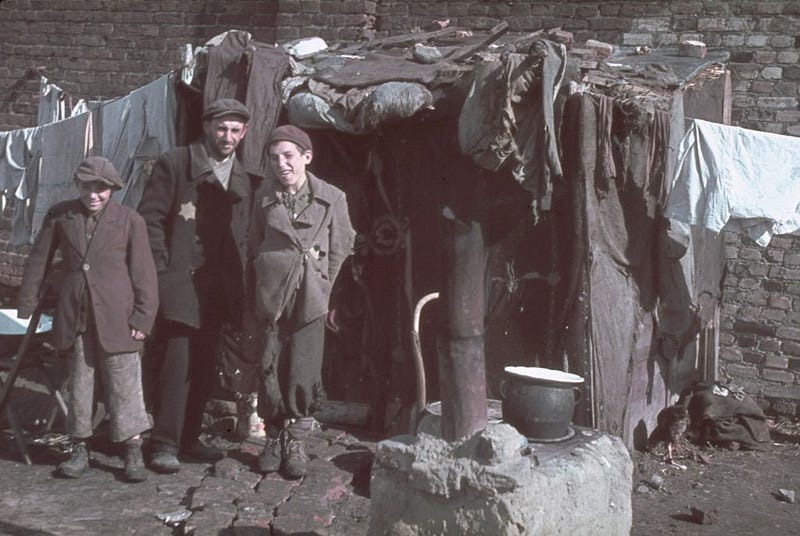Should Germany Pay Reparations To Poland?
Poland expects so, even if Germany claims the case is settled.
In 1952, the government of West Germany made a historic decision: they chose to pay Israel to compensate the small country for resettling huge numbers of Holocaust survivors, as well as reimbursing Jewish refugees directly.
The decision was controversial in West Germany itself (only 11% of the public supported it unconditionally, with 44% against), and was extremely unpopular with the Arab League, which threatened to boycott West Germany (before deciding it wasn’t economically viable to do so). In Israel, the negotiations prompted mass riots, with outraged Holocaust survivors calling the reparations blood money and arguing that accepting them would be forgiving Germany.
But the money was paid out, and more has been sent in the decades since. Germany has paid over €25 billion to individual Israelis and the state since then.

As a more or less voluntary payment to apologize for crimes against humanity, it was pretty much unprecedented. Many countries had been forced to pay reparations before (including Germany itself after both World Wars), but this time, Germany wasn’t being forced to pay out at gunpoint. It was paying reparations because it was the right thing to do — or, as a cynic might say, because those reparations were the price of being re-admitted to the human race.
When you do a good thing once, however, people come to expect it of you. In 2021, Germany found itself apologizing for colonial genocide in Namibia, when it wiped out most of the rebelling Herero and Nama tribespeople from 1904–1908; this admission of guilt came with a price tag of $1.3 billion.

But elsewhere, Germany has been very hesitant to back its apologies up with a chequebook. Formal requests by Tanzania and Burundi for colonial reparations have been ignored, perhaps because agreeing would tempt Togo, Cameroon and Ghana to put their hands out too. Calls from recent Greek governments to return to the table have also been ignored.
More significantly than all of these combined, however, is the situation of Poland, which claims to be owed $1.3 trillion, with a ‘t’ — 1,000 times more than Germany agreed to give Namibia. But as outrageous as the number seems, Poland’s request actually deserves serious thought.
In its 6 years of occupation under Nazi Germany, Poland lost up to 20% of its population, with most victims being civilians. Besides these murders, millions of Poles were also deported in an attempt to create “living space” for Nazi German settlers. The ultimate goal of the occupation was to deport or exterminate 85% of Poland’s ethnic Poles, and to use the remaining 15% as slave labour — a dark vision that was thankfully never completed.

It’s hard to do justice to the cruelty of the occupation. Collective punishment was the norm, with dozens of Poles executed for every German killed. Young women and priests were targeted for medical experiments. Polish girls and women were raped en masse, while others were used as prostitutes in military brothels.
Polish children who passed racial tests were abducted and sent to special centres to be Germanized; if the process was “successful”, they were put up for adoption with German families. Those who failed were expelled, killed, or used as slaves. At least 200,000 were kidnapped in this fashion.
High schools and universities were shut, and the Polish language was banned in elementary schools. Teachers, doctors and priests were hunted down (the Intelligenzaktion), and 80% of school libraries and 75% of academic libraries were torched. Churches, museums and historical monuments were vandalized.
The treatment of Polish Jews was, of course, even worse.

This all happened in living memory. There are still Poles today who remember this, yet haven’t received a penny of compensation. The atrocities are well-documented. So how on Earth can Germany refuse to pay reparations?
Well, from Germany’s point of view, the issue is settled because back in 1953, Poland waived its right to pursue compensation. What a magnanimous gesture from Poland, right? How kind of them to help the German economy rebuild.
If that sounds strange, here’s the real story: Poland, a Soviet Union puppet state in the decades after World War II, was pressured by the USSR to drop its reparations claims. The reason for this is that it would have left East Germany (also under USSR influence) open to reparations demands from other victims of Nazi aggression. To this day, East Germany’s share of reparations has not been paid, even to Israel.
Poland didn’t even receive direct payments from the general Allied reparations pool since it was agreed at Potsdam that Poland’s share would be sent to the Soviet Union and then distributed by them, to keep the Western Allies out of the Soviet Zone of influence after the war.

Poland today believes the view that its 1953 reparations waiver was non-binding since it was made under coercion, with 66% of the public supporting reparations.
Germany, on the other hand, says that it isn’t responsible for the USSR’s crimes, and the vast majority of Germans (75%) oppose the idea of paying reparations to Poland.
It also points out that Poland did receive territory from Germany after World War II (including the cities of Wroclaw, Szczecin and Gdansk) as part of a USSR-brokered deal to compensate Poland for Polish territories annexed by the USSR when Germany and the Soviet Union jointly invaded Poland at the beginning of the war.

Even at the best of times, Germany would struggle to afford Poland’s titanic reparations request — and now, as Germany’s creaking industrial economy enters recession, the idea is unthinkable. Yet morally speaking, it’s clear that Germany did enormous damage to Poland during the war, and then avoided most of the consequences afterwards on a technicality. It’s hard to call that justice.
But from the German point of view, it seems like it might never be done making amends for its past — and the Polish situation might sour Germany on the idea of accepting guilt and paying reparations generally.

These payments were fine when they were helping to establish diplomatic and economic ties (Israel was boycotting Germany and German goods after the war) or served as a cost-effective way of generating good publicity (a mere $1 billion to get some positive press across Africa? Probably paid itself back within the year through oil and mineral contracts going to German firms rather than British or French ones).
But Germany has very little to gain from paying Poland. As EU members, they already share markets, borders, laws, and much else besides. And Poland has become a prosperous, stable nation with a good quality of life, so it doesn’t make for much of a feel-good story to give it money, in much the same way that Britain would get much better press from giving reparations to Nigeria or India than Ireland or Singapore.
Indeed, the richest parts of Poland are better off than the poorest parts of Germany. If you agree to the Polish demands, how long will it be before somewhere like the Netherlands or Denmark starts calculating a new tab?

Poland hopes that younger generations of Germans will be more sympathetic (I doubt it), and is attempting to use United Nations forums to put pressure on its neighbour. Yet at the end of the day, the greatest legacy of Poland’s efforts might be making it harder for any of Germany’s victims to get a share of its economic pie.






